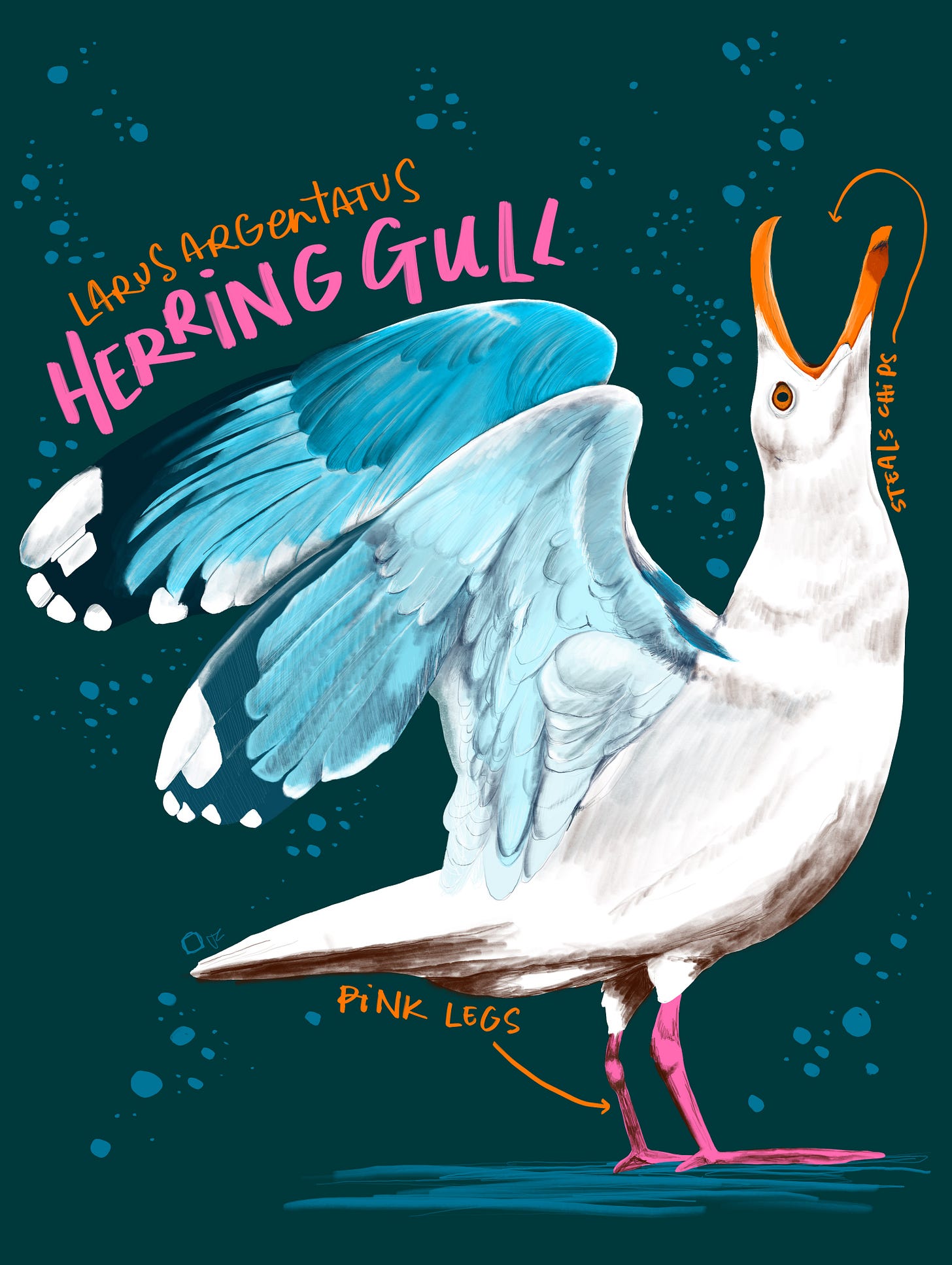Seagull
Nah, there's a bunch of them, and this post is specifically about a herring gull.
A seagull - or just a gull, really, to eschew the colloquialism - is any large, loud, obnoxiously clever seabird in the family Larinae.
(Immediate sidebar - would you like a post about taxonomy? Or maybe a series? I’ve never understood it, the naming conventions and families and domains and phylums… and I am always vaguely fascinated with Carl Linnaeus and how he decided to just describe, well, everything. If you know lots about taxonomy or want to put me in touch with someone who does - let’s chat. Leave a comment if this post/series idea sounds even vaguely entertaining and I’ll add it to the list, or equally, if it sounds frightfully dull)
If you’ve been signed up to Research Notes for a while, you might remember that I did a post about herring gulls a while back. You might also remember a slightly more recent post about a creative reset, which I whanged on about for a bit and then fell off the radar.
Eh, can’t get it right all the time.
In the interests of not getting it right all the time, I wanted to revisit some of my earlier posts to 1. put them up on Substack and 2. have a chance to redo the artwork. I think a lot of my earlier posts had a lot of potential and I want to try again. Because, is anything really ever finished? Certainly, the I felt that the herring gull needed another look, and you definitely needed more interesting facts about these birds, these opportunistic, terrifying plagues that are really just trying to get by in the world and don’t know that they are dicks.
There’s about 6 different types of seagull that breed here in the UK, and the herring gull is probably the one I most associate with the name seagull. It is the big old chunky bird that has pinkish legs and that dark red dot on its beak. Its chicks peck at that dot to tell their parents they are hungry (although I am under the impression they are always hungry as they can moan at their parents for food for over 6 months of their early lives, which I find baffling for a bird).
They are also, I think, astronomically long-lived. The oldest recorded herring gull was 49 years old. Typically, in the wild (the 49-er lived in captivity), they live somewhere between 12 and 20ish years, which still feels long. But, they are not sexually mature until they’re about 4, and while they fledge at about 6 weeks, they hang around near their parents for at least 3 months for food.
Larus argentatus (the European herring gull - Larus probably means gull or seabird and argentatus means decorated with silver. Aww! I really feel that is a juxtaposition with their personalities…) is big, sometimes up to 66cm long which is too close to a metre for my liking. They eat everything, and I mean everything. Fish and crustaceans are the main diet, although you’ve definitely seen them doing that stamping thing with their feet to mimic rain and bring up worms. It’s so cute I think, it almost makes them endearing. They will also eat some plants, will happily scavenge through rubbish and carrion, and if the opportunity presents itself to take down a pigeon or a rodent, they’ll do that too. They don’t have any particular preference for herring. Take from that what you will.
In the wild wilds, they would nest on the tops of cliffs, but in cities they love a flat roof - it’s warm and safe and feels a lot like a good cliff. It’s one of the reasons we get so many inland, to the detriment of the gulls, though. The species population has declined by 50% in 25 years and is protected by law here in the UK, and they are a Red listed species. This is predominantly because of warming sea temperatures and overfishing; the easily accessible food found at landfill sites and just kicking around town brought them into cities, but decimated their overall population. Resourceful, adaptable and clever, they’ve adapted to life with us very well, even although I can’t see one without thinking it’s giving me the stink-eye. I don’t think I’ll ever particularly like these birds, they’re not amazing like crows, but knowing more about them has given me a distant reverence, which is the least they probably deserve.



